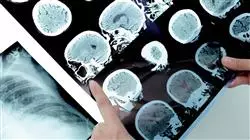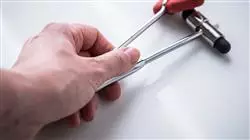University certificate
The world's largest faculty of physiotherapy”
Why study at TECH?
Our program is the most comprehensive neurological physiotherapy program on the market for you to specialize in treatments for people with multiple sclerosis, ALS or Huntington's disease"

The Postgraduate diploma in Neurological Physiotherapy in Multiple Sclerosis, ALS and Huntington's Disease has been designed to complement the training of physiotherapy professionals who work with people with neurodegenerative diseases, so that they acquire superior training that will allow them to apply the most advanced techniques in the field of rehabilitation, specific to each of these diseases.
Accordingly, the program contains a syllabus that delves into multiple sclerosis, covering the pathophysiology of demyelination of the white matter and the appearance of plaques that will help the physiotherapist to differentiate the clinical manifestations depending on each lesion: pyramidal, cerebellar, sensory, etc. Strategies to deal with spasticity and its consequences will also be analyzed; the latest advances in training programs for readaptation to effort, balance and coordination re-education will be presented.
There is also a section to study Amyotrophic Lateral Sclerosis (ALS), in which this disease will be described by explaining the symptoms and signs of involvement of the first and second motor neuron so that the physiotherapist can identify them. Once these concepts have been focused, the symptoms in the different phases of the disease will be analyzed: weakness, fasciculations, respiratory diseases, spasticity, pain, dysphagia, dysarthria, etc.
Finally, on Huntington's disease, the anatomical areas susceptible to lesions will be detailed: basal ganglia (striatum, caudate nucleus and pale globe) as well as the affected area of the cerebral cortex. As a result, the student will gain knowledge to promote and increase the ability to use complex brain functions such as attention, memory, understanding, integration of what was learned, judgment, problem solving and organization of time.
In short, TECH has set out to create contents of the highest teaching and educational quality that will turn students into successful professionals, following the highest quality standards in teaching at an international level. Therefore, TECH presents this program with comprehensive content that will help them become elite physiotherapists.
Immerse yourself in the study of this high-level Postgraduate diploma and improve your skills in therapies for people with degenerative diseases"
This Postgraduate diploma in Neurological Physiotherapy in Multiple Sclerosis, ALS and Huntington’s Disease contains the most complete and up-to-date scientific program on the market. The most important features include:
- Practical case studies presented by specialists in Neurological Physiotherapy
- The graphic, schematic and practical contents of the course are designed to provide all the essential information required for professional practice
- Exercises where the self-assessment process can be carried out to improve learning
- Algorithm-based interactive learning system for decisionmaking
- Special emphasis on innovative methodologies in Neurological Physiotherapy
- Theoretical lessons, questions to the expert, debate forums on controversial topics, and individual reflection assignments
- Content that is accessible from any fixed or portable device with an Internet connection
This Postgraduate diploma is the best investment you can make when selecting a refresher program, for two reasons: in addition to updating your knowledge in Neurological Physiotherapy, you will obtain a qualification endorsed by TECH"
It includes, in its teaching staff, professionals belonging to the field of physiotherapy, who pour into this training the experience of their work, in addition to recognized specialists of reference societies and prestigious universities.
The multimedia content, developed with the latest educational technology, will provide the professional with situated and contextual learning, i.e., a simulated environment that will provide immersive training programmed to train in real situations.
The design of this program focuses on Problem-Based Learning, by means of which the Physiotherapist must try to solve the different professional practice situations that arise throughout the academic year. For this purpose, the professional will be assisted by an innovative interactive video system created by renowned and experienced experts in Neurological Physiotherapy in Multiple Sclerosis, ALS and Huntington.
This Postgraduate diploma offers training in simulated environments, which provides an immersive learning experience designed to train for real-life situations"

A 100% online program that will allow you to balance your studies with your professional work while expanding your knowledge in this field"
Syllabus
The structure of the contents has been designed by a team of professionals who possess knowledge of the implications of training in daily practice, who are aware of the relevance of the current importance of quality education in the field of neurological physiotherapy and are committed to quality teaching through new educational technologies.

We have the most complete and up-to-date scientific program on the market. We want to provide you with the best training"
Module 1. Multiple Sclerosis
1.1. Introduction
1.1.1. Anatomy
1.1.2. Physiology
1.1.3. Classification
1.2. Epidemiology
1.3. Etiology
1.3.1. Transmission Mode
1.3.2. Frequency
1.3.3. Age of Onset
1.4. Evolution
1.5. Prognostic Factors
1.6. Evaluation/Diagnosis
1.6.1. Clinical Manifestations
1.6.2. Diagnostic Imaging
1.6.3. Neurological Examination
1.6.4. Neurological Assessment Scales
1.7. Treatment
1.7.1. Medical/Surgical Treatments
1.7.2. Physiotherapy
1.7.3. Occupational Therapy, Speech Therapy and Neuropsychology
1.8. Orthopedics
1.8.1. Support Products
1.8.2. Orthoses
1.9. Readaptation
1.9.1. Social Aspects/Support
1.9.2. Comprehensive Care for Patients, Families and Caregivers
1.10. Early Prevention and Detection
Module 2. Amyotrophic Lateral Sclerosis
2.1. Introduction
2.1.1. Anatomy
2.1.2. Physiology
2.1.3. Classification
2.2. Epidemiology
2.3. Etiology
2.3.1. Transmission Mode
2.3.2. Frequency
2.3.3. Starting Age
2.4. Evolution
2.5. Prognostic Factors
2.6. Evaluation/Diagnosis
2.6.1. Clinical Manifestations
2.6.2. Diagnostic Imaging
2.6.3. Neurological Examination
2.6.4. Neurological Assessment Scales
2.7. Treatment
2.7.1. Medical/Surgical Treatments
2.7.2. Physiotherapy
2.7.3. Occupational Therapy, Speech Therapy and Neuropsychology
2.8. Orthopedics
2.8.1. Support Products
2.8.2. Orthoses
2.9. Readaptation
2.9.1. Social Aspects/Support
2.9.2. Comprehensive Care for Patients, Families and Caregivers
2.10. Early Prevention and Detection
Module 3. Huntington's Disease
3.1. Introduction
3.1.1. Anatomy
3.1.2. Physiology
3.1.3. Classification
3.2. Epidemiology
3.3. Etiology
3.3.1. Transmission Mode
3.3.2. Frequency
3.3.3. Starting Age
3.4. Evolution
3.5. Prognostic Factors
3.6. Evaluation/Diagnosis
3.6.1. Clinical Manifestations
3.6.2. Diagnostic Imaging
3.6.3. Neurological Examination
3.6.4. Neurological Assessment Scales
3.7. Treatment
3.7.1. Medical/Surgical Treatments
3.7.2. Physiotherapy
3.7.3. Occupational Therapy, Speech Therapy and Neuropsychology.
3.8. Orthopedics
3.8.1. Support Products
3.8.2. Orthoses
3.9. Readaptation
3.9.1. Social Aspects/Support
3.9.2. Comprehensive Care for Patients, Families and Caregivers
3.10. Early Prevention and Detection

A unique, key and decisive training experience to boost your professional development”
Postgraduate Diploma in Neurological Physiotherapy in Multiple Sclerosis, ALS and Huntington's Disease.
Physiotherapeutic work represents an important pillar in different medical fields, thanks to its support in restorative procedures, patients with degenerative diseases manage to recover their lifestyle. However, this health field, like many others, has had significant advances over the years, such as neurological physical therapy, which allows the use of adaptive techniques to treat mobility disorders caused by pathologies of the central or peripheral nervous system. If your academic goals include specialization in this area, at TECH Global University you will find a Postgraduate Diploma in Neurological Physical Therapy in Multiple Sclerosis, ALS and Huntington's disease; focused on the most advanced rehabilitative techniques that contribute to the comprehensive recovery of mobility. Throughout the 450 hours of training, you will first explore the pathophysiology of multiple atrophy and its clinical manifestations (pyramidal, cerebellar, sensory), then you will identify the signs that affect the first and second motor neuron; finally, you will approach the advances in training programs (spasticity) that allow reeducating balance and coordination. As a result, you will be able to increase the patient's capacity and promote their brain functions (attention, memory, comprehension, integration and organization).
Specialize in the application of physiotherapy in neurodegenerative diseases.
In order to successfully execute each therapy, it is necessary to deepen your knowledge of the concepts that will allow you to identify the different symptoms according to the area of affectation. Therefore, you will initially learn the anatomical and functional bases of the nervous system involved in these diseases, in order to apply orthopedics, orthoses and appropriate support products that improve the overall condition of the patient. Once these criteria are focused, you will analyze the symptomatological phases of each pathology (weakness, fasciculations, spasticity, pain, dysphagia, swallowing and dysarthria) in order to implement physiotherapeutic tactics to supplement the cognitive involvement and movement impairment. You will study these concepts through an exclusive learning system that only TECH offers; to develop the Postgraduate Certificate you will only need to have a device connected to the internet. After completing your process, you will obtain a wealth of knowledge to design rehabilitation treatments and carry out preventive work to ensure the patient's overall wellbeing.







